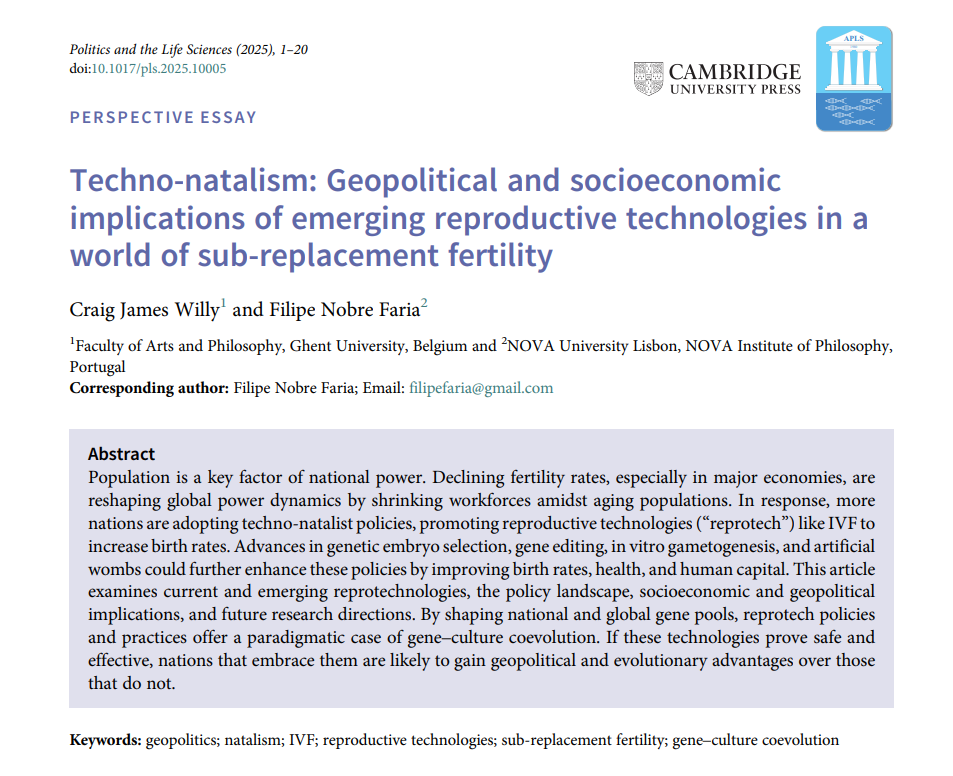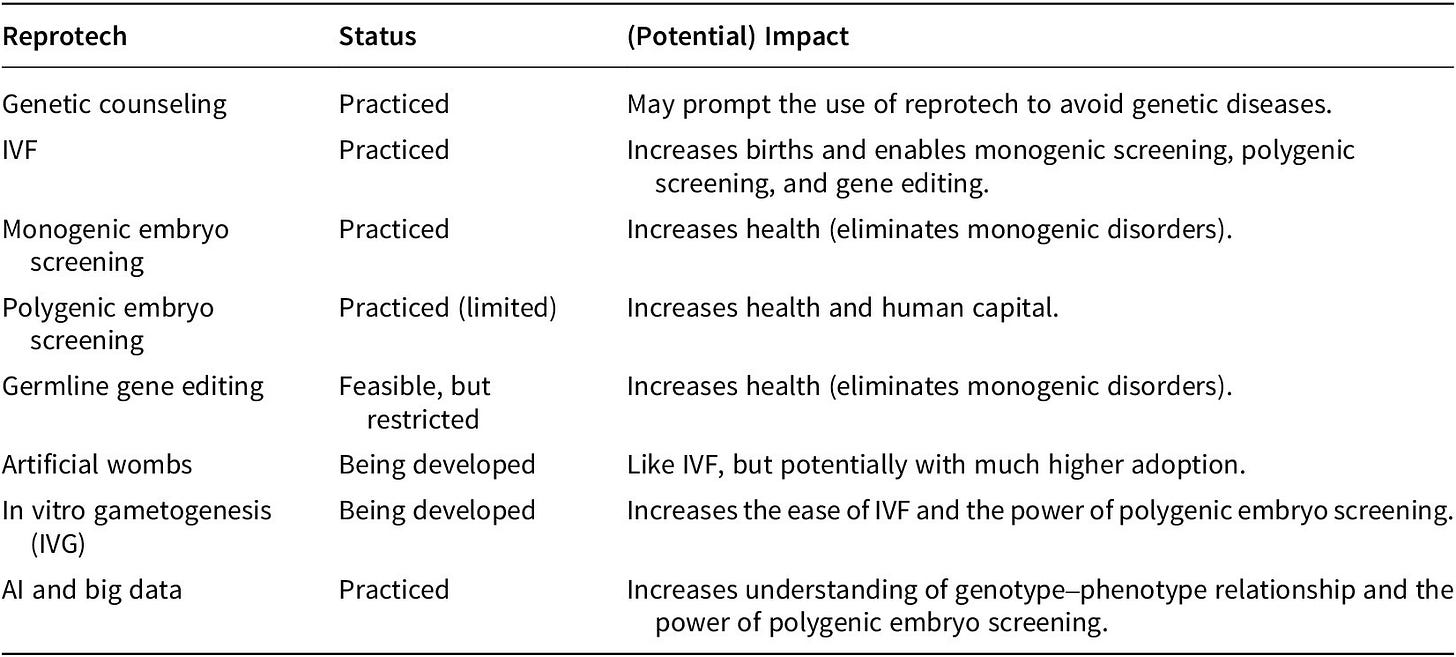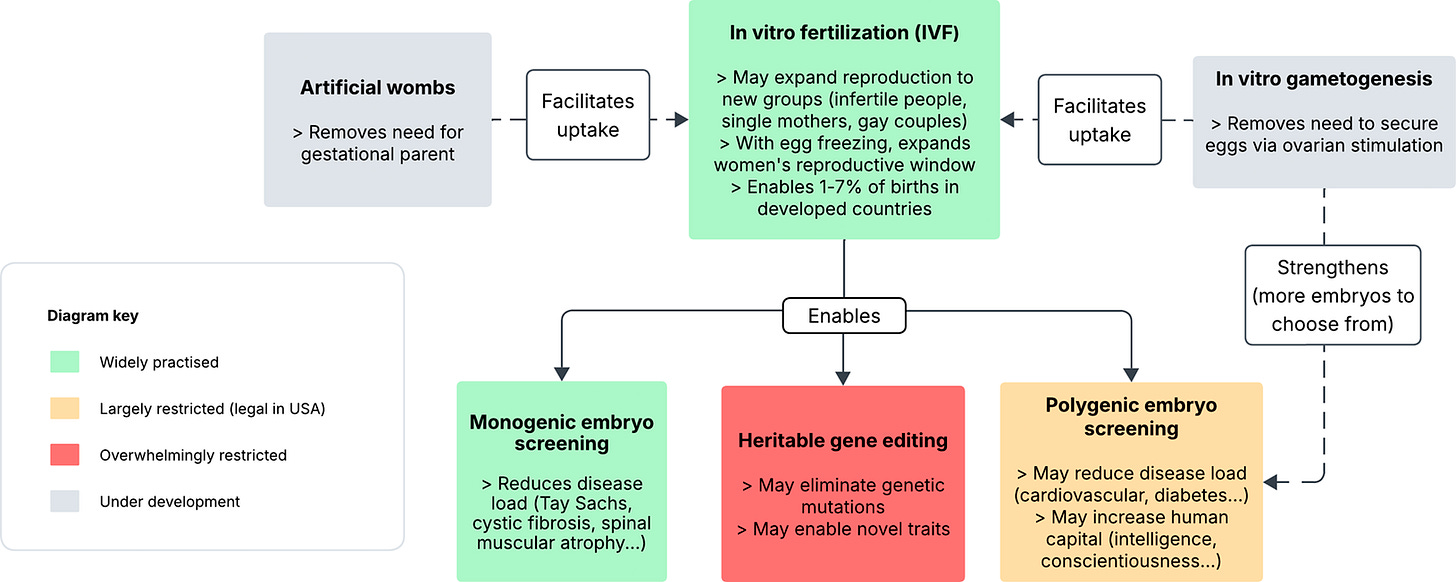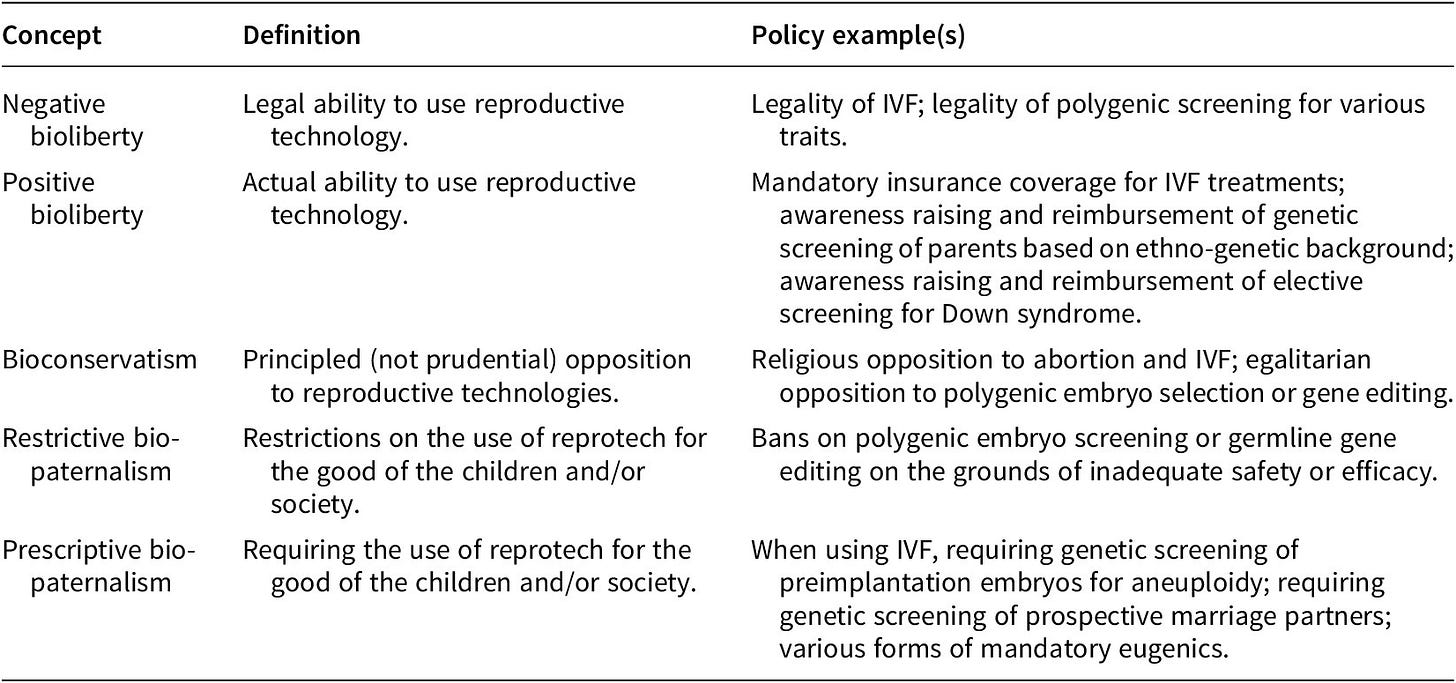Techno-natalism, ultra-low fertility and 21st century geopolitics
Our academic article is published in “Politics and the Life Sciences”
Note: This academic article has also been Visualized in 10 Points.
I am pleased to announce that Politics and the Life Sciences has published an in-depth academic article by myself and my friend Filipe Nobre Faria on the geopolitical and socioeconomic impact of reprotech in an age of collapsing fertility.
This article was written last December just before AI became a superhuman research assistant. Had the AI already been around, it certainly would have helped to identify relevant literature. Now that, at least in history and political science, AI pretty much has the ability to write an adequate master’s thesis in a matter of minutes, one wonders what the future of academic writing will or should be.
Below is a bullet point summary of our argument.
For every given level of socieconomic development and organizational capacity, population is a fundamental variable of national power (evidenced, among many other examples by the rise in U.S. power since the 18th century and the severe relative decline in French power during the 19th and early 20th centuries).
After a long population explosion, the world has entered a phase of sub-replacement fertility and even ultra-low fertility (1.4 children or less per woman) in many countries.
These countries’ geopolitical capacity declines over time as a shrinking working-age population must support the growing elderly population with its ballooning healthcare and pension costs. This trend has especially hit Italy and Japan, but will affect almost all developed countries, notably South Korea and China.
Sub-replacement fertility affects all of the more economically developed and techno-scientifically innovative countries in the world, with the notable exception of Israel. Shrinking and increasingly burdened workforces will reduce their capacity to contribute to global goods such as innovation and foreign aid.
The steady development of reproductive technologies (reprotech) is increasingly affecting demographic trends, with consequences not only for parents but also socioeconomic systems and geopolitics.
Reprotech does this by fostering population growth (thus a larger workforce), genetic health (reducing healthcare costs and productivity losses), and/or genetic enhancement (e.g., for intelligence and conscientiousness, thus fostering human capital, arguably the single most important factor for economic development and techno-scientific innovation).
Major reprotech breakthroughs in recent decades include:
IVF (conception in the lab)
Cheap genetic sequencing (enabling detection of genetic conditions and creating reams of genetic data)
AI (enabling you to make sense of said data, including the association of multiple genes with traits such as cardiovascular disease and intelligence)
Gene editing
Upcoming reprotech breakthroughs may include:
Artificial wombs
In vitro gametogenesis (IVG, creation of sperm or egg from other cells, has already been used to create offspring in mice)
Better understanding of associations between multiple genes and phenotypes, strengthening embryo selection for traits
The impact of these reprotechs is summarized below:
The current geopolitical impact of reprotech worldwide is marginal, contributing to 1-2% of births in developed countries. However, the impact in pro-reprotech nations is significant. In Denmark and Israel, IVF contributes 6-7% of all births.
In Israel, largescale genetic testing and embryo screening has enabled a dramatic reduction of monogenic diseases like Tay Sachs and Beta Thalassemia among new generations.
Governments in sub-replacement countries are increasingly moving to facilitate access to reprotech to increase the birth rate, as seen in the United States, France, and China.
As reprotech develops, there may be a tipping point when mass adoption occurs due to increasing ease of use and/or genetic potency. Reprotechs are often mutual enablers of one another, as summarized below:
Adoption of reprotech is certain to diverge depending on:
Nations’ unequal biotechnological capabilities (strongest in North America, Europe, East Asia, Israel, and the Arab Gulf states).
Nations’ differing policy goals (such as boosting birth rates and promoting genetic health) and the balancing of values such as freedom (reproductive), equality (which can motivate equal access to reprotech and/or suppression of genetic enhancement), and the sanctity of early-stage human life (often restricting use of reprotech, as in Germany).
The possible policy approaches to reprotech are summarized below.
In term of current trends, we can predict:
Mass adoption of reprotech is likely to initially occur in countries combining a heavy genetic disease load due to a history inbreeding and biotechnological capabilities. This would include Israel, the Gulf Arab states, and (at least for elites) India.
The U.S. is likely to continue to pioneer adoption of the most innovative reprotechs, due unmatched biotech capabilities, a critical mass of wealthy consumers, and lack of restrictive regulation.
Scholars like Alexis Heng Boon Chin have argued that, unless restricted, Confucian societies like China and Singapore are likely to adopt reprotech for genetic enhancement (which he calls “Confugenics”), driven by status-obsessed competitiveness. This will however very much depend on government choices (historically often restrictive).
Even if adoption remains at a fairly modest level in absolute numbers, reprotech’s impact may become geopolitically significant if only because fertility rates are otherwise so low, especially in the most innovative and powerful countries.
While the world is affected by many profound trends—climate change, infectious disease threats, AI, and old fashioned wars—population should not be neglected.
When considering the future power of the U.S., the EU, China, Russia, and other polities, population trends, and increasingly reprotech, will be a critical factor. As such, scholars should further explore the current and potential impact of emerging reprotech on socioeconomic systems and geopolitics.






"China and Singapore are likely to adopt reprotech for genetic enhancement (which he calls “Confugenics”), driven by status-obsessed competitiveness"??
Chinese labs like BGI have been working on reprotech for years offstage. Confugenics has been practiced for 2000 years, which is why you need a 140 IQ to get a job in the Civil Service.
What’s their plan for all the microplastics in brains, testicles, & ovaries?